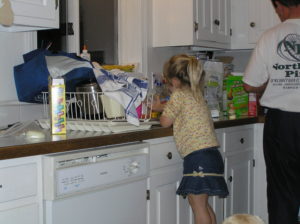What is the purpose of assigning chores for children?
Chores can teach children responsibility, improve children’s self-esteem, and give them a sense of accomplishment.
Giving a child chores could prepare them for independence when they move away.
The debate of assigning chores to children has been around for ages.

Before you decide whether or not chores are appropriate for your family consider reflecting on your household:
Write down a list of all the things you and your spouse do for the house, and what the kids’ do for their activities.
Go ahead and be specific.
Once you have the list – determine which items you do – vs – what your spouse does, which you share, trade-off back & forth, if any, and what realistically can you ask your children to do.
How often do these things need to get done? 1x per week, 2x per week, 1x per month, etc.
Why this exercise?
Because – If you are happy with how your household is running without:
- Feeling overworked
- Taken advantage of
- Disillusioned with how you thought family life would be like vs the reality you live
Go no further!
But – you would not be reading this article at all if you were not at least considering chores for your kids. So please, continue reading.

My husband and I have opposite views on whether or not our children should have been assigned chores. They are older teens now but when they were younger we had more than one “go at it” on this topic.
Compromising and remaining flexible is important when one wants to have a successful happy marriage.
My husband was all about assigning chores and helping around the house. He told us that he had to do chores when he was young and because of that he has an excellent work ethic.
I think I have a good work ethic as well and I did not grow up doing chores. My mom worked part-time at the local school and had the same schedule as us kids. She took care of the household chores. The results – no I am not lazy, I pay my bills, I am a functioning adult who volunteers, was the treasurer of the PTO for my kids’ dance team. I have a job (pre-COVID) and my home is mostly clean.
Two different adolescent upbringings, similar results. So how does that help you? Refer back to the beginning of the article.
Do the suggested exercise. Create the list.
Do you feel…
- Taken advantage of?
- The kids may actually like doing chores?
- Your kids could use a boost in their self-esteem?
- Perhaps the extra responsibility will help your kids focus, be better behaved?
- You are missing out on the fun? Are your kids and spouse out playing in the back yard while you watch from the kitchen window with your hands in a sink full of dirty dishes?

Why does it have to be called chores?
The word alone has such a negative connotation.
I was always willing to have my young toddlers “help” me with little things. For example, if they wanted a turn at putting a dish in the dishwasher or to try to push the big vacuum, I would let them.
Even pushing the buttons on the laundry machines and making a game out of sorting the clothes was fun, and dare I say it; educational.
As they got older and started school, after-school activities, and clubs I never assigned a specific list of tasks that they had to accomplish. (Nor did I pay them an allowance).
Adding to what seemed like a long list of responsibilities seemed unfair. Most days the kids were on the go and busy with their commitments more hours than most adults who work a full-time job.
Instead, I would take advantage of their free time by asking them to do something that they enjoyed (like cooking). This was fun for them and a huge time saver for me!
What is the difference between chores and just cleaning up after oneself?
What I wanted to impress on the kids is:
This is our house and we all have a part in making sure it runs smoothly. I never wanted my kids to do things around the house as a favor to me.
As they grew up, I also wanted my kids to: see a need, fill a need.
Meaning, that if the garbage was full, take it out, don’t wait to be asked.
If sister was sick and not up to scooping dog poop in the back yard then there should not be a national debate on doing it for her.
We are a family and when one is down someone has to pick up the slack because that is what you would want if it were you.
It’s called empathy, and TEACHING empathy makes your children better friends, teammates, spouses, coworkers, etc.
We all use the house, we all have clothes on our backs, we all play in the back yard, it’s the family dog, so we all take part in its maintenance, we all clean up after ourselves.
As parents did we get throwback?
Absolutely!
Did they refuse on many occasions to help out? Yup yup yup!
How did we handle it?
Just like discipline, I tried to be consistent, fair, and not lose my patience (That was the toughest part if I were to be honest
It could have gone something like:
“Mom, I am ready for snuggles and books.”
“I am sorry, I can’t. Remember when I asked you to sweep the floor after dinner? You told me it wasn’t your turn, oh, wait, I think it was; not my job.” Because I had to add that to my list of things to do, I don’t have time tonight.”
Of course, this broke my heart and it was hard not to cave in when the tears started flowing but she would remember this the next time she said no.
I am a talker so I talked to my kids a lot. My youngest did not do well with spontaneity. She needs a schedule. Knowing this I always tried to talk about the day(s) ahead, what was going on with who so there were few surprises. This allowed me to use a little motivation when asking for their help with a chore.
There is a party this Saturday. (Typically when I do the grocery shopping.) Putting the groceries away when I get home sure would make things go faster and then we could have more time at the party!
I also wanted to reward them from time to time when they went above and beyond. You know, keep it fresh, keep it creative (but not overboard).
“Thank you for changing the laundry without being asked. How about we get takeout for dinner and eat it at the beach tonight.”
When they were young I tried to teach them the “why.”
Thank you for putting away your toys. Putting things away when you are done using them makes it easier to find the next time you want them.
When you help load the dishwasher after meals it gives more time to snuggle and read books with you before bed.
When you put your shoes away when you come into the house it ensures no one trips on them and gets hurt. I appreciate your effort in trying to remember to do that.

Why didn’t I pay them an allowance for doing chores:
We should be encouraging doing things because they are the right thing to do, and it feels good to contribute.
I wanted these tasks to be considered a normal behavior and not as exceptional in a sense of completing them for the reward.
Assigning chores or giving an allowance for doing things that need to be done anyway, can diminish genuine motivation. ‘If someone has to pay me for doing this, it must not be worth doing for its own sake.’”
(related topic: Is Too Much Praise a Bad Thing?)
However, with that being said certain circumstances would come along that would warrant assigning chores and allowing them to earn money.
For example, Child #1 received a cell phone as a birthday gift. Since this added to our expenses we gave her 5 chores to complete monthly to earn the money to “pay” her portion of the phone bill.
Child #2 wanted to go to the fair with a friend. We had already paid for her to go to the fair once so the arrangement was that I would buy her ticket for admission and rides, but she would have to wash my car to earn money towards anything else she would want such as; junk food, face painting, etc.
Let’s list the pros of assigning chores:
1. Learn empathy.
Household tasks teach children about the importance of contributing to their families and working together, which translates into a better sense of empathy as adults.
2. Build critical thinking skills.
Childhood is when the functional anatomy of your brain is still actively growing and adapting. Hands-on experiences, especially ones rooted in physical activity that requires reasoning, are a critical part of that growth.
An example: If your child is setting the table, they’re moving and laying out plates, silverware, and more. But they’re also applying real-life analytical and math skills as they replicate each place setting, count utensils for the number of the people at the table, etc. This paves the way for success in other areas, including reading and writing.
3. Educational.
We’re not just talking about the obvious stuff like knowing how to mop the floor or mow the lawn.
Getting to see chemistry in action by helping to cook dinner or learning about biology by lending a hand in the garden.
There are other important skills like patience, persistence, teamwork, and work ethic.
4. If you chose to pay them for their chores:
They will learn the value of money and can buy their own stuff.
5. Less arguing –
- chores were done get paid.
- chores aren’t done no money.
6. More free time.
Your household could find a nice peaceful balance that was otherwise lacking because truth is, you were doing everything and you are exhausted. (Now go book that massage and have a much needed G.N.O.)
6. Appreciation.
Family members will appreciate you more because they see how much you do for them and how hard it is.
Yes – there are some CONS so let’s talk about them:
1.Additional Stress.
Kids may have too many after school activities already.
Plus the demands of homework.
2. Some jobs are really for adults to do, children should be able to trust their caregivers to provide basic care and kids should be kids.
3. Kids refuse to do them (or, let’s be honest, complain too much!)
4. Takes longer to get things done.
5. Could get hurt. Household accidents are a thing!
6. If you are paying them for the chores:
- it could mean more work for you because now you have another thing to keep track of.
- in the long run, unless you have adjusted your household budget to reflect this new expense; maybe you just can’t afford it.
7. Some people are very particular about how their house looks, at all times, and when you have a controlling personality, asking your kids to do chores may not be a good thing. If it causes you stress because you are unable to accept the finished product of their chores, and you end up redoing what they have done – do not ask them to do it.
You will absolutely destroy their self-esteem. Trust me on this – I am living proof that having someone come up behind you and redo or negatively comment on everything you do is gut-wrenching and has long term negative effects.
In conclusion:
Deciding to assign chores for your kiddos is a decision that you need to make based on your family needs, your child’s maturity, and abilities to handle additional responsibilities.
Whether the chores are perceived as fun, financially motivating, or, just plain unnecessary; you want your children to grow into hard-working independent, and successful adults.
Don’t worry they will! Because if you stuck with this article as long as you did, you are a dedicated parent who is determined to make the right decisions.
Add a few chores, see how it goes; too much, take one away.
Offer help from time to time when they feel a little overwhelmed with a big test coming up at school; a big match this Saturday; or an extra team practice got scheduled last minute, etc.
- Remain flexible
- Stay consistent with consequences because they will have a blatant disregard for their chores from time to time.
- Most importantly; continue to love them as much as you do because it will all work out no matter if you choose Yes or No.
